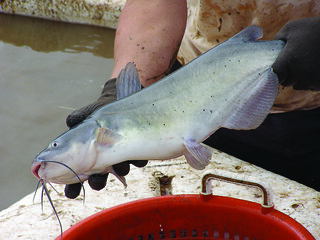Spring is the time to stock channel catfish
(216 words)
PINE BLUFF, Ark. -- Channel catfish has become one of Arkansas’ favorite sportfish by providing fun fishing and tasty filets. Channel catfish are also a popular choice for private pond stocking; especially for ponds that are less than one acre, constantly muddy or for those ponds that never seem to grow bluegill or largemouth bass well, according to Scott Jones, Small Impoundment Extension Specialist at the University of Arkansas at Pine Bluff.
“Although channel catfish can reproduce in small ponds, predation from largemouth bass and other factors prevent them from maintaining their population in most cases,” Jones said. “This makes periodic restocking necessary.”
Once channel catfish catch rates drop below the satisfaction of those fishing the pond, it is time to restock with up to 100 channel catfish per acre, according to Jones. “Spring is a great time to stock these fish,” he said.
Jones said that pond owners should never stock small catfish fingerlings into a pond that contains largemouth bass. “Bass are voracious predators that devour fingerlings quickly after they are stocked,” he said. “The solution is to stock catfish that are at least 8 inches long.”
For more information on channel catfish stocking in private ponds, where to purchase them or any other questions regarding private ponds, contact your local University of Arkansas Cooperative Extension Service office.
Debbie Archer, Communications Specialist
School of Agriculture, Fisheries and Human Sciences
University of Arkansas at Pine Bluff
(870) 575-8546
darcher@uada.edu
